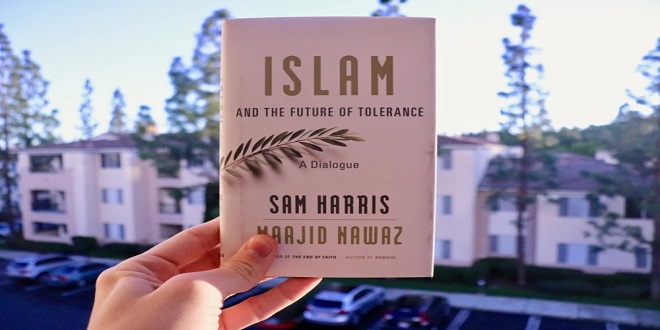Islam and the Future of Tolerance A Dialogue

The Scope of the Problem
In your work, you make a distinction between “revolutionary Islamists and jihadists. I think we should defi ne these terms. I would also like to know how you think public opinion is divided in Muslim communities. I picture several concentric circles: At the center are groups like the Islamic State,5 alqaeda, al Shebab, Boko Haram, and so on. Their members apparently wake each morning yearning to kill infidels and apostates. Many of them also seem eager to be martyred in the pro cess.
We have chosen to use the name “the Islamic State” without prejudice, simply because that is what the group calls itself, and this is increasingly how it is referred to in the media. Our usage is not a judgment about the validity of this group’s claims to represent the true Islam or to have established a caliphate. This book is itself a broader examination of the validity of such claims
us refer to these people as “jihadists.” Then there is a larger circle of Islamists who are more politically motivated and appear less eager to kill and be killed. Beyond that is a wider circle of Muslims who probably support jihad and Islamism financially, morally, or philosophically but are not inclined to get their hands dirty.
Finally, one hopes, there is a much larger circle of so called moderate Muslims, whether they would label themselves that way or not, who want to live by more modern values. Although they may not be quite secular, they don’t think that groups like the Islamic State represent their faith.
Perhaps there are also millions of truly secular Muslims who just don’t have a voice. I’m wondering whether you think my understanding of these categories is correct, and if so, what percentage of the earth’s 1.6 billion Muslims you would put into each of them
Islamism and jihadism are politicized, contemporary readings of Islam and jihad; they are not Islam and jihad per se. As I’ve said, Islam is a traditional religion like any other, replete with sects, denominations, and variant readings. But Islamism is the desire to impose any of those readings on society. It is commonly expressed as the desire to enforce a version of shariah as law
Po litical Islamists seek to impose their views through the ballot box, biding their time until they can infiltrate the institutions of society from within. Revolutionary Islamists seek change from outside the system in one clean sweep. Militant Islamists are jihadists
It is true that no traditional reading of jihad can ignore the idea of armed strugle, and it is incredibly naive to insist that Muslims ever held jihad to mean an inner strugle only. However, any and all armed struggles, in any or no religious contexts, can be defensive or offensive, just or unjust, reactive or preemptive, and terroristic or conventionally militaristic. My usage of jihadism refers only to a par tic u lar armed strugle
Let’s move now to your concentric circles. At the center of the inner circle at the moment is the Islamic State, which has come to eclipse al- Qaeda. Its members are what I call global jihadists. Then you have more regional jihadists.
They, too, use force to spread Islamism, but they tend to restrict themselves to both a geographic and a demographic focus, and they are less unhinged. Hamas and Hizbollah are in this category. Jihadists are, by anyone’s account, a minority of Muslims in the world, but they are the most or ga nized and have the most power, and they dominate the discourse Bereitgestellt von




